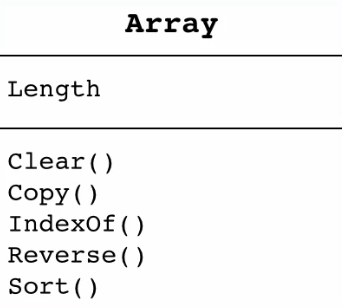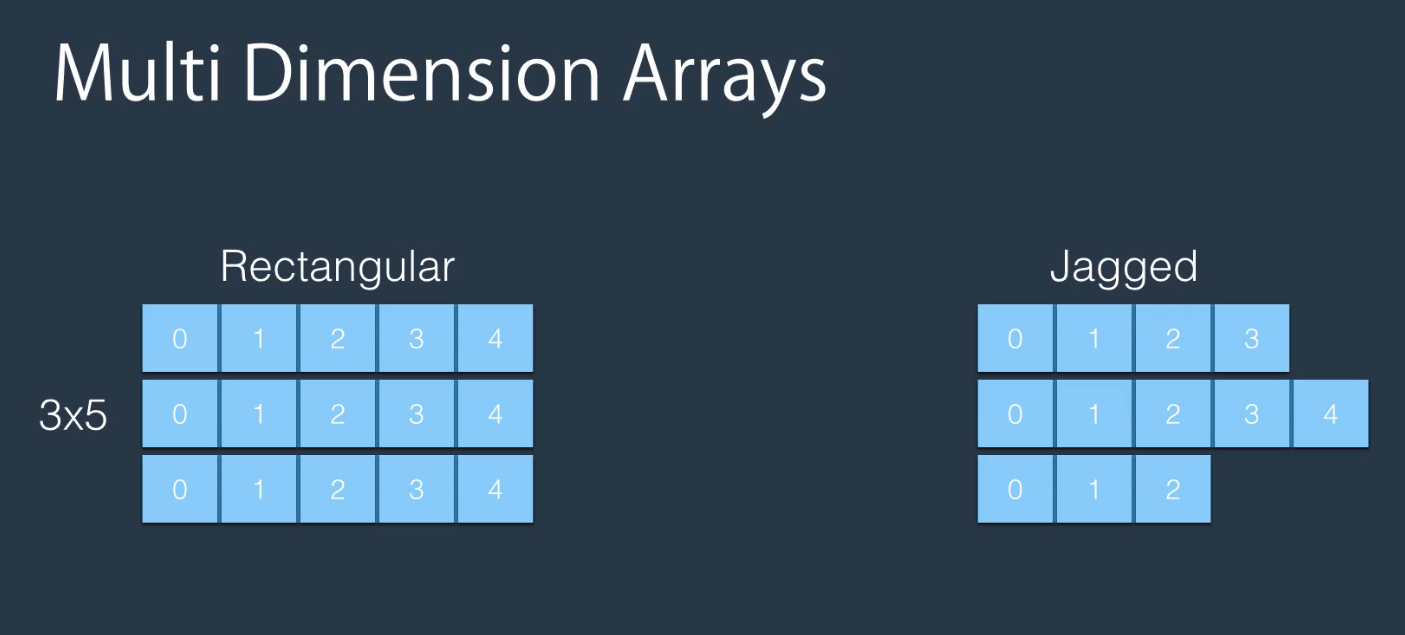-
It’s a multi value in one variable with the same data type
-
هي عبارة عن Reference Types يعني لما بعمل array جديدة يبقا بعمل object from array class
-
Non-primitive → Reference → Heap
Array Properties
- Fixed Type (Same Data Type)
- Fixed Size (Static Array)
- Sequential in the memory
- Support direct accessing
Array Types
- Single Dimensional Array
- Multi Dimensional Array
- Jadgged Array
Create an Array
DataType[] arrayName = new DateType[size];
int[] Arr;
//Declaration for refrence of int Array
//Zero Bytes have been allocated in Heap
Arr = new int[5]; // allocated in heap now : To use later
// Will give here initial value and in this case will be 0 (default)
// String -> NULL
int[] Arr = new int[5] { 3, 4, 5, 6, 7 };
int[] Arr = new int[] { 3, 4, 5, 6, 7 };
int[] Arr = { 3, 4, 5, 6, 7 };Access the elements and change it
طبعا بتوصل للعناصر من خلال ال index بتاعها
string[] cars = {"Volvo", "BMW", "Ford", "Mazda"};
Console.WriteLine(cars[0]);
// Outputs Volvoوبرضو بنفس الطريقة أقدر أغير قيمة جواه
string[] cars = {"Volvo", "BMW", "Ford", "Mazda"};
cars[0] = "Opel";
Console.WriteLine(cars[0]);
// Now outputs Opel instead of VolvoLoop through Array
ممكن أستخدم أي طريقة هنا Iteration Statements وخصوصا ال foreach
int[] arr = new int[3]; // 0 0 0
for(int i = 0; i < arr.Length; i++)
{
arr[i] = int.Parse(Console.ReadLine());
}
// We can't use foreach in this caseArray as reference
int[] Arr01 = { 1, 7, 5, 3, 8, 6, 4, 2 };
int[] Arr02 = { 7, 8, 9 };
Console.WriteLine($"Arr01 {Arr01.GetHashCode()}"); // Arr01 27252167
Console.WriteLine($"Arr02 {Arr02.GetHashCode()}"); // Arr02 59941933
Arr02 = Arr01;
/// Same Object , Two References
Console.WriteLine("Arr02 = Arr01");
Arr02 = (int[])Arr01.Clone();
/// int[] = (int[])object ;
/// Derived = Base : Not Valid must use Explicit Casting
/// ref To Base = Derived : Valid
/// Arr02 new Object with new(diff) identity but same state as Arr01
Console.WriteLine("After Clone");
Console.WriteLine($"Arr01 {Arr01.GetHashCode()}"); // Arr01 27252167
Console.WriteLine($"Arr02 {Arr02.GetHashCode()}"); // Arr02 2606490
for (int i = 0; i < Arr02.Length; i++)
Console.Write($"{Arr02[i]} , ");
Console.WriteLine("");
/*
Arr01 27252167
Arr02 59941933
Arr02 = Arr01
After Clone
Arr01 27252167
Arr02 2606490
1 , 7 , 5 , 3 , 8 , 6 , 4 , 2 ,
*/- اللي حصل ان كل array متخزنة في الأول في ال heap عادي بس في اماكن مختلفة، ولو خليت الأول بيساوي التاني فدا معناه اني بس خليت الأول يشاور على التاني والداتا اللي كانت في الأول بقت unreachable زي ما قولنا قبل كدا
- انما لو عايز أخزن الداتا في الarray التانية فكدا لازم أخد نسخة من المحتوى بتاعه الأول وأحطه في التاني
- بس في الحالة دي مش هينفع لأن
cloneبترجع من النوعobjectودا يعتبر الشامل ومن قواعد ال OOP ان ال base = derived انما ال derived != base فكدا لازم أعمل Explicit Casting
- شرح قاعدة ال OPP: مش كل class هو car ولكن كل car عبارة عن class
Array Methods

Array Length
string[] cars = {"Volvo", "BMW", "Ford", "Mazda"};
Console.WriteLine(cars.Length);
// Outputs 4
int[] Arr01 = { 1, 7, 5, 3, 8, 6, 4, 2 };
Array.Sort(Arr01);
//rank: نوعها ايه
Console.WriteLine($"Size {Arr01.Length} , Number of Dimensions {Arr01.Rank}");Array copy
Array.Copy method is used to copy elements from one array to another.
This method provides a way to duplicate the contents of an array into another array, either partially or fully, depending on the parameters used.
Basic Syntax
public static void Copy(Array sourceArray, Array destinationArray, int length);Parameters
- sourceArray: The array that contains the data to be copied.
- destinationArray: The array that will receive the copied data.
- length: The number of elements to copy.
Overloads
There are several overloads of the Array.Copy method that allow for more flexibility:
-
Basic Copy
Array.Copy(sourceArray, destinationArray, length); -
Specifying Indices
public static void Copy(Array sourceArray, int sourceIndex, Array destinationArray, int destinationIndex, int length);Copies
lengthelements fromsourceArraystarting atsourceIndextodestinationArraystarting atdestinationIndex.
Example Usage
Here’s an example demonstrating how to use Array.Copy:
using System;
class Program
{
static void Main()
{
int[] sourceArray = { 1, 2, 3, 4, 5 };
int[] destinationArray = new int[5];
// Copying the entire array
Array.Copy(sourceArray, destinationArray, sourceArray.Length);
// Displaying the contents of the destination array
foreach (int item in destinationArray)
{
Console.WriteLine(item);
}
// Copying a part of the array
int[] partialDestinationArray = new int[3];
Array.Copy(sourceArray, 1, partialDestinationArray, 0, 3);
// Displaying the contents of the partial destination array
foreach (int item in partialDestinationArray)
{
Console.WriteLine(item);
}
}
}Important Considerations
- Type Compatibility: Both the source and destination arrays must be of compatible types, otherwise a runtime exception will occur.
- Bounds Checking: Ensure that the destination array is large enough to hold the copied elements to avoid an
ArgumentOutOfRangeException. - Shallow Copy:
Array.Copyperforms a shallow copy, meaning if the array contains reference types, only the references are copied, not the actual objects. Shallow Copy
Using Array.Copy is a straightforward way to duplicate or move data between arrays in C#, providing flexibility through its various overloads and ease of use.
We talked more about Cs Shallow and deep copy
Array Clone
دي بستخدمها عشان أعمل Deep Copy
Sort an Array
هنستخدم ال method اللي اسمها Sort() وبترتب تصاعدي وال method دي موجودة جوا class ال Array
// Sort a string
string[] cars = {"Volvo", "BMW", "Ford", "Mazda"};
Array.Sort(cars);
foreach (string i in cars)
{
Console.WriteLine(i);
}
// Sort an int
int[] myNumbers = {5, 1, 8, 9};
Array.Sort(myNumbers);
foreach (int i in myNumbers)
{
Console.WriteLine(i);
}- We can reverse an array with
Reversefunction.
int[] arr = {10, 20, 30};
Array.Reverse(arr); // 30 , 20 , 10- If I want to sort desc: So we will use
Sortby default asc, and thenReverse
int[] arr = {20, 100, 50, 10};
Array.Sort(arr); // 10, 20, 50, 100
Array.Reverse(arr); // 100, 50, 20, 10System.Linq Namespace
بتخليني أعمل فيلتر على الداتا وأنا بشتغل على ال DB مثلًا
Other useful array methods, such as Min, Max, and Sum, can be found in the System.Linq namespace
using System;
using System.Linq;
namespace MyApplication
{
class Program
{
static void Main(string[] args)
{
int[] myNumbers = {5, 1, 8, 9};
Console.WriteLine(myNumbers.Max());
// returns the largest value
Console.WriteLine(myNumbers.Min());
// returns the smallest value
Console.WriteLine(myNumbers.Sum());
// returns the sum of elements
}
}
}Multidimensional Arrays

A multidimensional array is basically an array of arrays.
dataType[,] arrayName = new dataType[dimension1, dimension2];
// `dimension1`: The size of the first dimension. (X)
// `dimension2`: The size of the second dimension. (Y)
// OR
int[,] numbers = { {1, 4, 2}, {3, 6, 8} };Good to know: The single comma
[,]specifies that the array is two-dimensional. A three-dimensional array would have two commas:int[,,].
example
using System;
class Program
{
static void Main()
{
// Create a 3x3 two-dimensional array
int[,] matrix = new int[3, 3];
// Initialize the array
matrix[0, 0] = 1;
matrix[0, 1] = 2;
matrix[0, 2] = 3;
matrix[1, 0] = 4;
matrix[1, 1] = 5;
matrix[1, 2] = 6;
matrix[2, 0] = 7;
matrix[2, 1] = 8;
matrix[2, 2] = 9;
// Display the array elements
for (int i = 0; i < matrix.GetLength(0); i++)
{
for (int j = 0; j < matrix.GetLength(1); j++)
{
Console.Write(matrix[i, j] + "\t");
}
Console.WriteLine();
}
}
}
using System;
class Program
{
static void Main()
{
// Create and initialize a 2x3 two-dimensional array
int[,] matrix = new int[,]
{
{ 1, 2, 3 },
{ 4, 5, 6 }
};
// Display the array elements
for (int i = 0; i < matrix.GetLength(0); i++)
{
for (int j = 0; j < matrix.GetLength(1); j++)
{
Console.Write(matrix[i, j] + "\t");
}
Console.WriteLine();
}
}
}
Access and change
int[,] numbers = { {1, 4, 2}, {3, 6, 8} };
Console.WriteLine(numbers[0, 2]); // Outputs 2
numbers[0, 0] = 5; // Change value to 5
Console.WriteLine(numbers[0, 0]); // Outputs 5 instead of 1Loop through 2D array
int[,] numbers = { {1, 4, 2}, {3, 6, 8} };
foreach (int i in numbers)
{
Console.WriteLine(i);
}Length
هناك كنا بنستخدم Length انما هنا هنستخدم GetLength()
int[,] numbers = { {1, 4, 2}, {3, 6, 8} };
for (int i = 0; i < numbers.GetLength(0); i++)
{
for (int j = 0; j < numbers.GetLength(1); j++)
{
Console.WriteLine(numbers[i, j]);
}
}